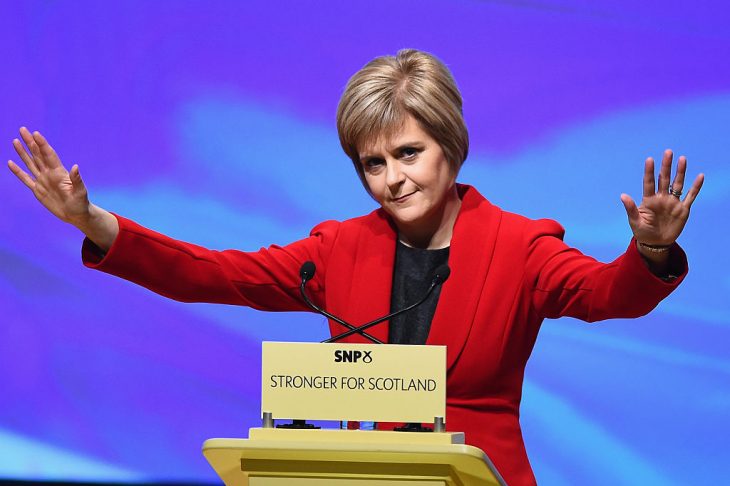Like the past, Scotland is a different country. Things are done differently here. What might be thought eyebrow-raisingly inappropriate in a larger polity is considered normal here. Consider these three examples:
- In 2015, Scottish Television decided it was a good idea to make Nicola Sturgeon, together with her sister and her mother, the star of its Hogmanay broadcast. New Year with the Sturgeon’s was in turn hosted by Elaine C Smith, the comedienne who was, conveniently, also a member of Yes Scotland’s advisory board during the 2014 independence referendum.
- Earlier this month, the SNP rolled-out the first ‘baby boxes’ that will be delivered to every new-born infant in Scotland. The idea, borrowed from Finland, is to support mothers by providing a kind of starter-pack for infancy. Useful items; helpful advice and so on. Unobjectionable, even if it’s also not likely, on its own, to reduce infant mortality quite as much as its advocates would have us believe. But, also included in the boxes, is a poem written by Jackie Kay, Scotland’s equivalent of the poet laureate. The poem, titled ‘Welcome Wee One‘, is unexceptional in the extreme; its inclusion in the baby box scheme is more significant.
- This morning, the Daily Record, once Scotland’s biggest-selling daily newspaper and for decades a staunch, even mulish, supporter of the Labour party, announced it had secured the services of a new star columnist: Nicola Sturgeon.

Now, individually, none of these things are especially important; taken together, they are modestly revealing. If you doubt this, I ask you to consider the reaction if, say, ITV had made ‘New Year with the Camerons’ the centrepiece of their New Year’s Eve programme. I ask you to consider the reaction if the poet laureate agreed to write a poem celebrating – and therefore supporting – a new government policy (‘Ode to the Bedroom Tax‘ perhaps?). And I ask you to consider the reaction if the Sun or the Daily Mail gave Theresa May a weekly pulpit from which she could ‘directly address’ the electorate. (Or at least that portion of the electorate that bought the paper in question.) In each instance, I fancy there would have been a rumpus. A confected and exaggerated rumpus perhaps, but a rumpus that still rested on the vague but real apprehension that something wasn’t quite right about any of this. Not just not quite right, but a little off. Worth a raised eyebrow, anyway.
Now a small country is a cosy place, albeit also one where marginal differences are magnified out of all proportion. Such, if you like, is the narcissism of tinyness. And in small places, perhaps the rules which apply in larger places are neither as necessary nor as useful. It’s not unusual for politicians to write newspaper columns after all (Kezia Dugdale, the Scottish Labour party’s leader, also writes a column for the Record) but I can’t think, off-hand, of a comparable example whereby the head of government – even a devolved government – has been given this kind of platform.
It is a reminder, if any were needed, that while talk of Scotland as a one-party state is overblown – the SNP is after all a minority government – Scotland is a country dominated by just one party. That has consequences, not the least of which is a realisation – commercial as well as political – that crossing the SNP may be unwise.
So be it. The Record – home of the ballyhooed, over-hyped Vow and thus, in the eyes of nationalist zoomers, a bastion of Quisling-journalism – has been edging in this direction for some time. Murray Foote, the paper’s splendid editor, appreciates that since half the country votes SNP there’s a need to, shall we say, placate some of those voters by giving them at least some of what they might want. No-one but no-one believes the Record would campaign in any future referendum as ardently for the Union as it did in 2014. Squaring the Record in the same manner the Scottish Sun was squared years ago is a significant victory for the nationalists (and a reminder that while much of the alt-Nat community thinks the mainstream press an irrelevance, sensible people know a little better).
As I say, there is nothing disreputable about accommodating yourself to Scotland’s new reality. The SNP aren’t going away any time soon. Almost everything is political in Scotland these days. Many people – perhaps too many people – on both sides of the constitutional divide measure developments by the extent to which they further the ambitions of Team Nat or Team Yoon.
So just as there are idiots who think the BBC weather map a conspiracy to make Scotland seem awful small, so there are Unionists who think the use of the Scots vernacular – and the pretence the phonetic rendition of a Scots accent makes a language – the thin edge of the nationalist wedge. Each party of extremes takes its cue, spiritually anyway, from what the American conservative Frank Meyer once wrote were the ‘totalitarian implications of the federal school lunch programme‘. Scotland these days is a land of mountainous molehills. No-one can relax and everything is a battleground in a zero-sum game of attritional constitutional warfare.
Again, none of the examples highlighted here are especially egregious when considered individually. Collectively, however, they show how the prevailing winds still blow from a nationalist direction. But that’s also the inevitable consequence of a politics whose centre of gravity has been shifting towards nationalism for more than 30 years. To put it in fashionable terms, Unionism is almost binary but nationalism exists on a spectrum.







Comments